Top Rankings
Palm Springs Unified School District ranks among the top 20% of public school district in California for:
Category
Attribute
Community Size
Largest student body (number of students) (Top 1%)
For the 2025 school year, there is 1 public charter school serving 850 students in Palm Springs Unified School District. This district's average charter testing ranking is 8/10, which is in the top 30% of public charter schools in California.
Public Charter School in Palm Springs Unified School District have an average math proficiency score of 32% (versus the California public charter school average of 31%), and reading proficiency score of 55% (versus the 48% statewide average).
Minority enrollment is 91% of the student body (majority Hispanic), which is more than the California public charter school average of 75% (majority Hispanic).
Overview
This School District
This State (CA)
# Schools
27 Schools
1,300 Schools
# Students
19,797 Students
711,386 Students
# Teachers
969 Teachers
31,394 Teachers
Student : Teacher Ratio
20:1
20:1
District Rank
Palm Springs Unified School District, which is ranked #1280 of all 1,925 school districts in California (based off of combined math and reading proficiency testing data) for the 2021-2022 school year.
The school district's graduation rate of 89% has decreased from 91% over five school years.
Overall District Rank
#1278 out of 1941 school districts
(Bottom 50%)
(Bottom 50%)
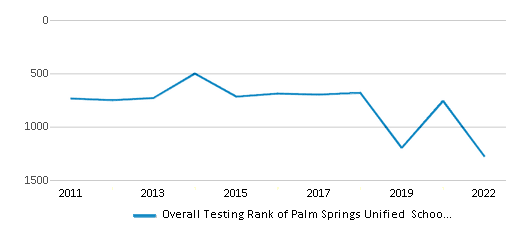
Math Test Scores (% Proficient)
20%
33%
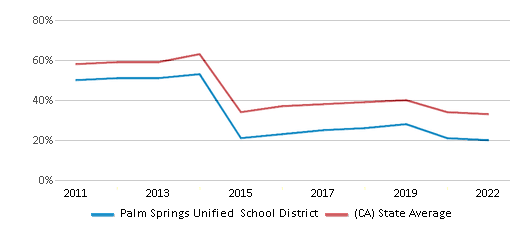
Reading/Language Arts Test Scores (% Proficient)
36%
47%
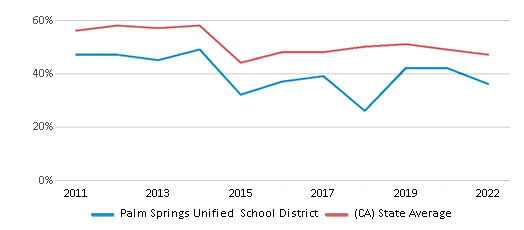
Science Test Scores (% Proficient)
18%
29%
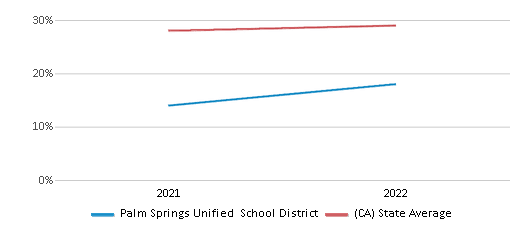
Graduation Rate
89%
87%
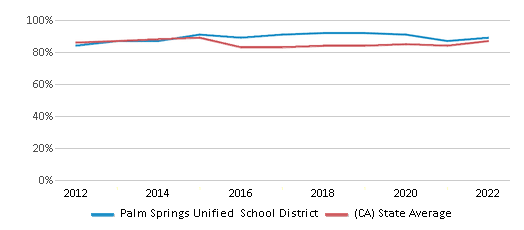
Students by Ethnicity:
Diversity Score
0.33
0.65
# American Indian Students
74 Students
3,137 Students
% American Indian Students
n/a
1%
# Asian Students
500 Students
49,250 Students
% Asian Students
3%
7%
# Hispanic Students
16,127 Students
378,755 Students
% Hispanic Students
81%
53%
# Black Students
765 Students
48,500 Students
% Black Students
4%
7%
# White Students
1,715 Students
176,738 Students
% White Students
9%
25%
# Hawaiian Students
31 Students
2,385 Students
% Hawaiian Students
n/a
n/a
# Two or more races Students
562 Students
48,230 Students
% of Two or more races Students
3%
7%
Students by Grade:
# Students in PK Grade:
-
83
# Students in K Grade:
1,556
60,517
# Students in 1st Grade:
1,329
46,070
# Students in 2nd Grade:
1,335
47,155
# Students in 3rd Grade:
1,415
46,520
# Students in 4th Grade:
1,471
46,583
# Students in 5th Grade:
1,499
46,919
# Students in 6th Grade:
1,522
54,274
# Students in 7th Grade:
1,505
57,837
# Students in 8th Grade:
1,554
57,970
# Students in 9th Grade:
1,559
70,272
# Students in 10th Grade:
1,579
64,790
# Students in 11th Grade:
1,682
57,670
# Students in 12th Grade:
1,791
54,726
# Ungraded Students:
-
-
District Revenue and Spending
The revenue/student of $23,748 is higher than the state median of $19,974. The school district revenue/student has grown by 9% over four school years.
The school district's spending/student of $20,450 is higher than the state median of $18,396. The school district spending/student has grown by 9% over four school years.
Total Revenue
$470 MM
$116,387 MM
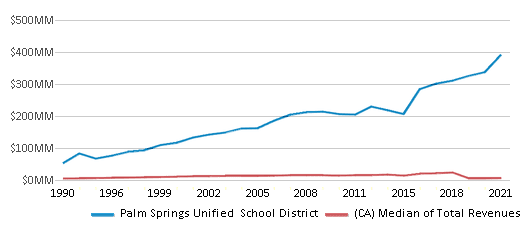
Spending
$405 MM
$107,188 MM
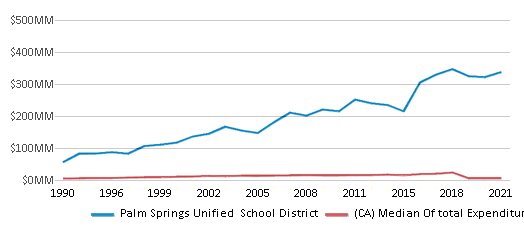
Revenue / Student
$23,748
$19,974
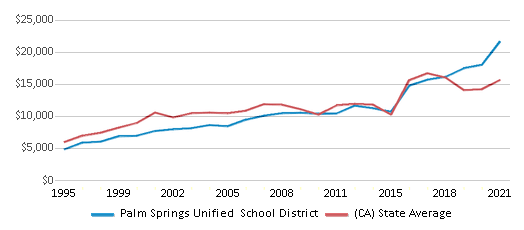
Spending / Student
$20,450
$18,396
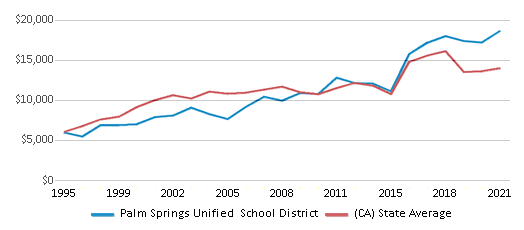
Best Palm Springs Unified School District Public Charter Schools (2025)
School
(Math and Reading Proficiency)
(Math and Reading Proficiency)
Location
Grades
Students
Rank: #11.
Cielo Vista Charter
Charter School
(Math: 32% | Reading: 55%)
Rank:
Rank:
7/
Top 50%10
650 South Paseo Dorotea
Palm Springs, CA 92264
(760) 416-8250
Palm Springs, CA 92264
(760) 416-8250
Grades: K-8
| 850 students
Recent Articles

Year-Round Or Traditional Schedule?
Which is more appropriate for your child? A year-round attendance schedule or traditional schedule? We look at the pros and cons.

Why You Should Encourage Your Child to Join a Sports Team
Participating in team sports has a great many benefits for children, there is no doubt. In this article you will learn what those benefits are.

White Students are Now the Minority in U.S. Public Schools
Increasing birth rates among immigrant families from Asia and Central and South America, combined with lower birth rates among white families, means that for the first time in history, public school students in the United States are majority-minority. This shift in demographics poses difficulties for schools as they work to accommodate children of varying language abilities and socio-economic backgrounds.





